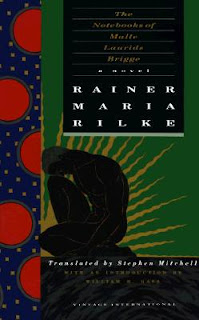The Notebooks of Malte Laurids Brigge
 The Notebooks of Malte Laurids Brigge, by Rainer Maria Rilke
The Notebooks of Malte Laurids Brigge, by Rainer Maria RilkeRilke wrote one novel, and this is it. At the time, he was living in Paris, having left his new wife and baby behind while he went in search of some income (and to get away from said baby, who was so inconsiderate as to cry and want to eat while he doing important stuff like being inspired and all; everyday life is too vulgar for a poet). Notebooks was largely written out of his experiences in Paris.
Malte Laurids Brigge is a young Danish aristocrat of sorts--the poor sort--living in Paris. His two notebooks/journals consist of his experiences, memories, and imaginings. There isn't really a plot to speak of; the thread goes back and forth and it's just like a real notebook in a real young man's life--a life based very much on Rilke's own. Sometimes he's looking at young women students copying the Cluny tapestries (see?? I told you they were everywhere), and sometimes he's thinking of his childhood in a large Danish manor house. I liked the childhood parts best, actually. He thinks about death a lot, of course; the deaths of his parents and death in general. It's totally unclear how he got from a rather fancy childhood to being down and out in Paris.
I found it wandery and was mostly not enthralled, though sometimes I was. Probably there are hidden depths that I didn't get, or maybe I'm just not a Rilke person.




Could you see the relationship with Niels Lyhne? Or is that more theoretical? I haven't read the Rilke.
ReplyDeleteEh...insofar as they were aimless young men, sure, but I felt like Lyhne had a more German Romantic mood moving into realism--plus a plot and more clarity--while Brigge was more impressionistic. It didn't have a lot of shape to it (that I could see). I didn't feel like they were close cousins. You should try it, you're way more analytical than I am and would probably do better.
ReplyDeleteNow this is getting really weird ..... more Cluny tapestries? Seriously?!! If you come across any more of them, perhaps you've crossed into another dimension, or something .... ;-)
ReplyDelete